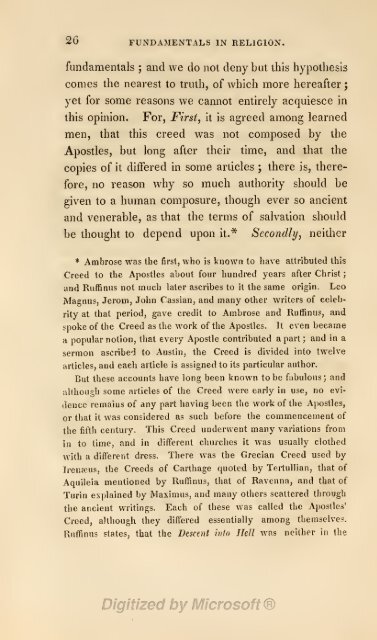A collection of essays and tracts in theology - The Preterist Archive
A collection of essays and tracts in theology - The Preterist Archive
A collection of essays and tracts in theology - The Preterist Archive
You also want an ePaper? Increase the reach of your titles
YUMPU automatically turns print PDFs into web optimized ePapers that Google loves.
26 FUNDAMENTALS IN RELIGION.<br />
fundamentals ;<br />
<strong>and</strong> we do not deny but this hypothesis<br />
comes the nearest to truth, <strong>of</strong> which more hereafter ;<br />
yet for some reasons we cannot entirely acquiesce <strong>in</strong><br />
this op<strong>in</strong>ion. For, First,<br />
it is<br />
agreed among learned<br />
men, that this creed was not composed by the<br />
Apostles, but long after their time, <strong>and</strong> that the<br />
copies <strong>of</strong> it differed <strong>in</strong> some articles ;<br />
there is, therefore,<br />
no reason why so much authority<br />
should be<br />
given to a human composure, though ever so ancient<br />
<strong>and</strong> venerable, as that the terms <strong>of</strong> salvation should<br />
be thought to depend upon it.* Secondly, neither<br />
* Ambrose was the first, who is known to have attributed this<br />
Creed to the Apostles about four hundred years after Christ ;<br />
<strong>and</strong> Ruff<strong>in</strong>us not much later ascribes to it the same orig<strong>in</strong>. Leo<br />
Magnus, Jerom, John Cassian, <strong>and</strong> many other<br />
writers <strong>of</strong> celebrity<br />
at that period, gave credit to Ambrose <strong>and</strong> Ruff<strong>in</strong>us, <strong>and</strong><br />
spoke <strong>of</strong> the Creed as the work <strong>of</strong> the Apostles. It even became<br />
a popular notion, that every Apostle contributed apart; <strong>and</strong> <strong>in</strong> a<br />
sermon ascribed to Aust<strong>in</strong>, the Creed is divided <strong>in</strong>to twelve<br />
articles, <strong>and</strong> each article is assigned to its particular author.<br />
But these accounts have long been known to be fabulous; <strong>and</strong><br />
although some articles <strong>of</strong> the Creed were early <strong>in</strong> use,<br />
no evidence<br />
rema<strong>in</strong>s <strong>of</strong> any part hav<strong>in</strong>g been the work <strong>of</strong> the Apostles,<br />
or that it was considered as such before the commencement <strong>of</strong><br />
the fifth century. This Creed underwent many variations from<br />
<strong>in</strong> to time, <strong>and</strong> <strong>in</strong> different churches it was usually clothed<br />
with a different dress. <strong>The</strong>re was the Grecian Creed used by<br />
Irenaeus, the Creeds <strong>of</strong> Carthage quoted by Tertullian, that <strong>of</strong><br />
Aquileia mentioned by Ruff<strong>in</strong>us, that <strong>of</strong> Ravenna, <strong>and</strong> that <strong>of</strong><br />
Tur<strong>in</strong> expla<strong>in</strong>ed by Maximus, <strong>and</strong> many others scattered through<br />
the ancient writ<strong>in</strong>gs. Each <strong>of</strong> these was called the Apostles'<br />
Creed, although they differed essentially among themselves.<br />
Ruff<strong>in</strong>us states, that the Descent <strong>in</strong>fo Hell was neither <strong>in</strong> the
















